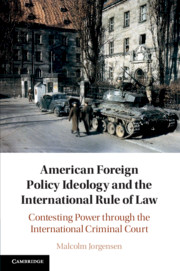 American Foreign Policy Ideology and the International Rule of Law
American Foreign Policy Ideology and the International Rule of Law from Part II - Contesting Global Legal Power through the ICC
Published online by Cambridge University Press: 12 December 2019
Part II of the book applies the ideological model developed in Part I to reconsider the history of American ICC policy in its full ideological context. Each of the post–Cold War presidencies, up to that of President Obama, is analysed in terms of ideology’s impact on the three identified rule of law elements. Chapter 4 considers the Clinton administration (1992–2000), where US policy was characterised as contradictory for traversing from a prominent advocate of the project in the early years, to conspicuously voting against the final treaty establishing the court, then signing it, but warning against Senate ratification. The dominant conception of the international rule of law is shown to be liberal internationalism, combined with competing illiberal internationalist beliefs. Despite similar policy outcomes, this represented a shift from the primarily illiberal internationalist policy of the George H. W. Bush (Bush 41) administration. The design advocated by global advocates remained structured by legalist principles not recognised by US policymakers, such that US policy appeared contradictory for following internally coherent ideological conceptions of IL.
To save this book to your Kindle, first ensure [email protected] is added to your Approved Personal Document E-mail List under your Personal Document Settings on the Manage Your Content and Devices page of your Amazon account. Then enter the ‘name’ part of your Kindle email address below. Find out more about saving to your Kindle.
Note you can select to save to either the @free.kindle.com or @kindle.com variations. ‘@free.kindle.com’ emails are free but can only be saved to your device when it is connected to wi-fi. ‘@kindle.com’ emails can be delivered even when you are not connected to wi-fi, but note that service fees apply.
Find out more about the Kindle Personal Document Service.
To save content items to your account, please confirm that you agree to abide by our usage policies. If this is the first time you use this feature, you will be asked to authorise Cambridge Core to connect with your account. Find out more about saving content to Dropbox.
To save content items to your account, please confirm that you agree to abide by our usage policies. If this is the first time you use this feature, you will be asked to authorise Cambridge Core to connect with your account. Find out more about saving content to Google Drive.